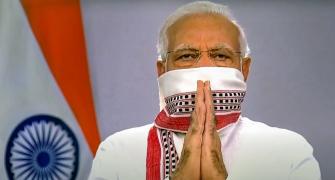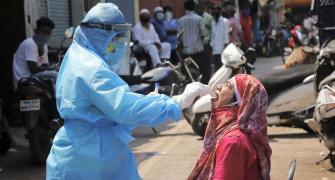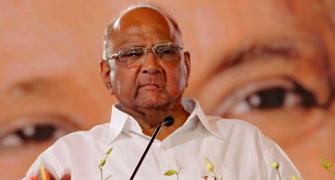Ahead of his meeting with chief ministers next week, Prime Minister Narendra Modi on Saturday reviewed the steps being taken to contain the COVID-19 pandemic in areas with high case load and the road map for effective management of the situation.

In view of the challenges being faced in the country's response to the pandemic, particularly by large cities with large number of infections, the meet focussed on augmenting testing as well as the number of beds and services to effectively handle the peak surge of daily cases, according to a statement issued by the Prime Minister's Office.
In a tweet later, the prime minister said he reviewed the COVID-19 situation across the nation during the high-level meeting.
"We also reviewed the roadmap ahead, and steps to contain the pandemic in the parts where most cases are coming from," he said.
The meeting comes against the backdrop of rising number of coronavirus cases in the country.
According to health ministry figures issued on Saturday morning, India's COVID-19 tally breached the three-lakh mark with a record single-day spike of 11,458 infections, while the death toll rose to 8,884 with 386 new fatalities.
"The present and emerging scenario of the COVID-19 disease in the capital" was also discussed and the projections for next two months was deliberated, the statement said.
Modi suggested that the Home Minister and the Health Minister should convene an emergency meeting with the Lt Governor and the Chief Minister of Delhi, along with senior officials of the central and the NCT governments as also officials of municipal corporations of Delhi, to plan a "coordinated and comprehensive response" to the pandemic.
The meets suggested by the prime minister are taking place on Sunday.
The meeting was attended by Home Minister Amit Shah, Health Minister Harsh Vardhan, Principal Secretary to PM P K Mishra, Cabinet Secretary Rajiv Gauba, the Health Secretary, the ICMR DG and representatives of various empowered groups.
Member of NITI Aayog and convenor of the Empowered Group of Medical Emergency Management Plan Vinod Paul made a detailed presentation on the current status and likely scenario of COVID-19 cases in the medium term.
"It was observed that out of the total cases two-thirds are in five states with an overwhelming proportion of cases in big cities," the statement said.
The prime minister took cognisance of the recommendations of the Empowered Group on city -- and district-wise requirements of hospital beds and isolation beds.
He instructed health ministry officials to undertake emergency planning in consultation with various states and union territories.
He also advised the ministry to ensure suitable preparations in view of the start of the monsoon season.
It was noted and appreciated in the meeting that there have been many instances of outstanding work done by several states, districts and cities in containing and controlling the outbreak successfully.
These success stories and best practices should be widely disseminated to provide inspiration and innovative ideas to others.
On Jun 16 and 17, the prime minister will hold virtual meets with chief ministers and union territory representatives against the backdrop of rising number of coronavirus cases in the country.
Under "Unlock 1" several relaxations have been made for public and businesses to ensure that economic activities hit by the lockdown gather momentum.
For the virtual meet, the states have been divided into two groups.
Representatives of 21 states and union territories, including Punjab and some northeastern states, will hold interaction with the prime minister on June 16.
The rest 15, including West Bengal, Delhi, Maharashtra and Karnataka, where the coronavirus cases are on a much higher side, will interact with Modi on June 17.
This would be the prime minister's sixth round of consultation with the chief ministers, the last being on May 11.
Home Minister Amit Shah spoke with all the chief ministers over telephone in the last week of May, just before lockdown-4 was to end.










